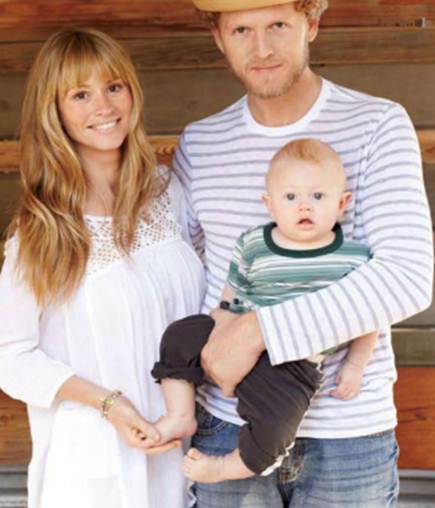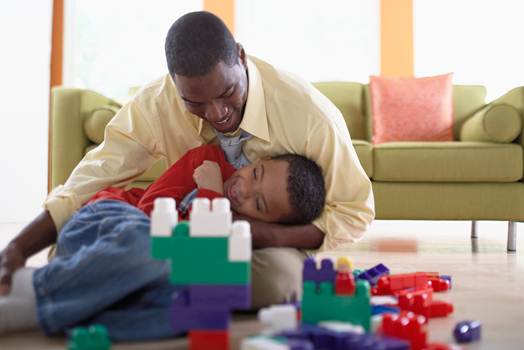More and more families are having just one
baby, yet ‘only child’ stereotypes persist. Here’s what the experts say.
Like most parents
Like most parents, my husband and I always
tried to make perfect choices, from the seemingly small (the perfect diaper
pail) to the potentially life-changing (deciding how many kids to have). The
longer we had our one child, the more we felt she was all we needed, yet the
old myths continued to worry us: Would she be lonely and spoiled? Were we being
selfish by not giving her a sibling? Would the task of caring for us in our old
age fall on her shoulders alone?

Having
only one baby can benefit the whole family.
Thanks to delayed childbearing,
environmental concerns, the current economic crisis and other factors,
single-child families like ours are no longer the rarity they once were:
According to Census Bureau’s Current Population Survey in 2011, an estimated 15
million U.S. households today have one child. Still, many parents who—whether
by choice or necessity—are contemplating stopping at one continue to struggle
with misconception-fueled confusion and guilt. If you’re in this spot, here’s
what the research and experts can tell you.
Is one really a lonely number?
Many parents feel they need to supply a
sibling for their first child so that he or she will have a built-in friend.
Not true, says social psychologist Susan Newman, Ph.D., the “Singletons”
blogger for Psychology Today and author of The Case for the Only
Child (Heath Communications, Inc.). Newman cites two Ohio State University
studies demonstrating that while only children may have a very small social
deficit in kindergarten, by middle school they have as many friends as their
counterparts with siblings.
Only children have a vested interest in
cultivating skills like sharing and compromise, Newman says. “They realize
early on that they need their friends—their sibling substitutes—and that bad
behavior won’t preserve those relationships,” she explains. Indeed, I’ve
observed a strong diplomatic quality in my daughter that has allowed her to
easily make and keep friends.
Spare the sibling, spoil the child?
It is true that singletons enjoy more
access to parental attention and material resources than a child with siblings.
At least partly as a result, they tend to be well- adjusted high achievers (see
“An ‘Online’ Report Card,” pg. 63). Studies have consistently found them to
have not only greater cognitive abilities, but also higher levels of maturity
and social sensitivity—not characteristics of a “spoiled” child. And rather
than overindulging, many parents of an only child find it a relief in
economically stressful times just to be able to provide necessities for the
family.

many
parents of an only child find it a relief in economically stressful times just
to be able to provide necessities for the family
Studies on birth order actually relegate
feelings of entitlement and “spoiling” to the baby of the family. Psychologist
Kevin Leman, Ph.D., author of The Birth Order Book (Revell), explains
that because parents are often “taught out” when the last-born child arrives,
they let him or her slide on chores or give in easily to his or her tantrums.
These are the same parents who made every activity with their first-born (who,
of course, began as an “only”) instructional. Laden with high parental
expectations, the only (or first-born) child naturally wants to achieve and
please.
What about elder care?
If you think you should have more than one
child to care for you when you’re old, forget about it: There are no guarantees
that adult children will equally share the burden.
In fact, one child (in our case, my older
sister) typically shoulders it anyway, and elder care can be a source of conflict
instead of a comfort. Research commissioned by the Home Instead Senior Care
network found that 46 percent of family caregivers say their sibling
relationships deteriorated because of their siblings’ unwillingness to share
care.
Making the choice
For most people, the family size “decision”
happens over time. It’s based partly on reason, partly on personal history and
usually topped off by a large portion of fate. Newman counsels parents who are
wrestling with how many children to have to resist feeling pressured and
instead ask themselves, “What kind of lifestyle do I want for me and my child?
And what can I realistically handle?”
In our case, finances were tight after our
daughter was born, because I had scaled back work and my husband changed
careers. And I am also a member of the growing Sandwich Generation, people who
are simultaneously facing child care and elder care responsibilities. I cannot
forget the many harried shopping trips during which I found myself chasing my
toddler daughter in one direction as my Alzheimer’s-stricken dad wandered off
in another.
Our daughter is 8 years old now and, for
us, the only-child myths have proved to be just that. She even balks at the
idea of having a sibling. When a singleton friend announced that his family was
adopting, she expressed concerns that we, too, might want to adopt. In
reassuring her, I put my own lingering worries to rest. Every family, I told
her, has to be just the right size for them, and she is, in fact, just enough
for us.
AN ‘ONUES’ report card
Psychologist Kevin Leman, Ph.D., author of The
Birth Order Book (Revell), maintains that only children share some general
characteristics, including the following: STRENGTHS Good decision-maker
Thorough and organized Ambitious and enterprising goal-setters Academically
minded and good problem-solvers WEAKNESSES Can be self-centered If parents
aren’t careful May be inflexible and hard to satisfy Not happy with surprises
Can be overly serious, driven or logical.